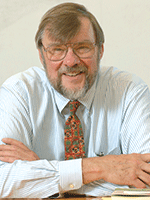Organizational Researchers Honor J. Richard Hackman’s Legacy

J. Richard Hackman’s research identified the conditions and leadership styles that promote effective team performance.
J. Richard Hackman spent nearly a half century exploring the dynamics of teamwork and effective leadership, leaving an indelible mark on the field of organizational psychology. Hackman, a 2013 APS James McKeen Cattell Fellow, passed away in January, and a few of his former students and collaborators gathered at the 25th APS Annual Convention to honor his legacy.
Hackman’s research identified the conditions and leadership styles that foster effective team performance. His findings emerged from fieldwork involving sports teams, corporate boards, musical groups, hospital staffs, and others. One of his best known contributions is the concept of bracketing — the multi-level influences (both internal and external) on team functioning and outcomes.
“If you do team research, you can’t not build off his work. Everything he’s done serves as an anchor for what we’ve all done over the last 30 years,” said Stephen E. Humphrey, an associate professor of management at Pennsylvania State University, in a tribute session titled “So There Is an ‘I’ in Teams…and a ‘We’…and a ‘Circumstance .’”
Speakers during the session discussed several discoveries that have sprung from Hackman’s research:
- The cognitive ability of certain members of the team is paramount to its success, Humphrey said. Not surprisingly, the smarter a core team member is, the more disruption that person’s departure causes. Also unsurprisingly, replacing a highly competent team member with an incompetent person disrupts the team’s effectiveness. But interestingly, replacing that person with someone who is only moderately competent is even more disruptive, he noted, since that person is limited in the number of problems he or she can solve.
- Anita Woolley, assistant professor of organizational behavior and theory at Carnegie Mellon University, worked with Hackman on the Group Brain Project, a Harvard initiative aimed at studying whether groups had an intelligence that was above and beyond the abilities of individual members. In one initial study, the research team had 40 groups spend five hours together in the lab. Each member of the groups took an IQ test, and then the teams conducted a diverse range of tasks. “We wanted to see if the groups that did well on one set of tasks could do well on others,” Woolley said. “We found that they did. This indicated an underlying collective intelligence. And we replicated this study using a different range of tasks and larger groups.” Over the course of subsequent studies, the Group Brain Project found that groups show more intelligence when more women are members.
- Professor of management John Mathieu and his students at the University of Connecticut have been examining leadership design, including distributed and collective structures. Longitudinal research, he says, shows that distributed leadership is the ideal set-up, where each member of a team can “call the shots” in their own area of expertise.
Ruth Wageman, a visiting scholar in Harvard’s psychology department and close collaborator of Hackman’s, shared her research showing that the design of teams is far more powerful in its effectiveness than is its leadership. In a study of self-managing field teams, she found that even highly competent coaching by a team leader cannot reverse the impact of flawed team design.
References and Recommended Readings
Woolley, A. W., Chabris, C. F., Pentland A., Hashmi, N. & Malone, T. M. (2010). Evidence for collective intelligence factor in the performance of human groups. Science, 330, 686–688.
Maynard, T., Gilson, L. L., Mathieu, J. E. (2012). Empowerment — fad or fab? A multi-level review of the last decades of research. Journal of Management, 38, 1231–1281.
Wageman, R., Nunes, D. A. , Burruss, J. A., & Hackman, J. R. (2008). Senior leadership teams: What it takes to make them great. Boston: Harvard Business School Press.
Hackman, J. R. (2002). Leading teams: Setting the stage for great performances. Boston, MA: Harvard Business School Press.





Comments
I have been teaching educational leadership courses for twenty years. I was deeply saddend when I learned that Richard Hackman had passed away. His research on groups and teams influenced my thinking about teams for many years and it continues to enrich the seminars that I teach on the team building process. The doctoral studnts who had the good fortune to work with him were very lucky. His contributions to our understanding of what makes teams effective were immense and I celebrate the outstanding contributions this fine scholar made to the field of leadership stUdies. A. E. Ted Wall
APS regularly opens certain online articles for discussion on our website. Effective February 2021, you must be a logged-in APS member to post comments. By posting a comment, you agree to our Community Guidelines and the display of your profile information, including your name and affiliation. Any opinions, findings, conclusions, or recommendations present in article comments are those of the writers and do not necessarily reflect the views of APS or the article’s author. For more information, please see our Community Guidelines.
Please login with your APS account to comment.